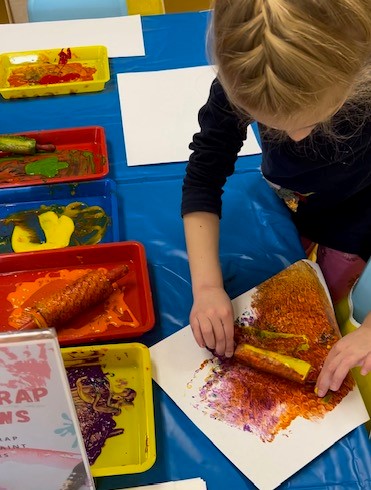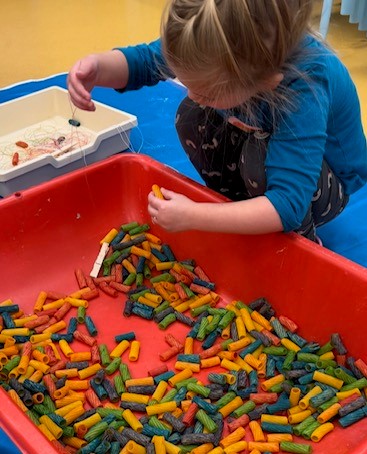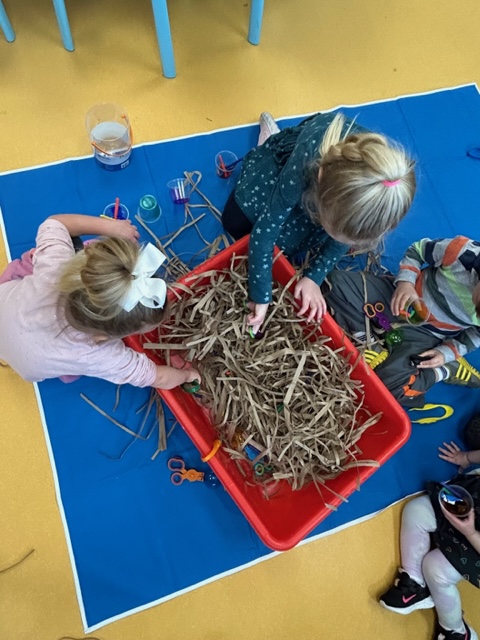Play-based learning is one of the most effective ways for children to actively engage in their environment. The great news is that sensory play is a toddler and early childhood favorite. For kids and adults, sensory play is a fun and enjoyable experience. Who doesn’t love to get messy or experiment with different smells or textures? I have even noticed that running my hands through a bin of rice for a few minutes can totally calm my mind and body as an adult.
Sensory play isn’t just fun, though, it is an important part of childhood development. It allows children to engage with the world around them in a meaningful way, and helps to develop their cognitive, social, and emotional skills.
Getting Messy: Why Sensory Play is Worth the Cleanup
Sensory play involves using the senses – touch, taste, smell, sight, and sound – to explore and learn about the world. There are all kinds of options for sensory play including playing with water, sand, oatmeal, rice, or playdough. An elaborate sensory table and materials are not necessary to benefit from sensory play. Although I love a themed sensory bin, my daughters have been just as happy to play with shredded paper, grass, flower petals, or dried leaves.
For me, the mess is worth the benefits of sensory play. The fact that I can set up a simple activity that promotes creativity, problem-solving skills, cognitive and emotional development, fine motor skill practice, and is still fun sounds like a no brainer to me. By allowing children to engage in sensory play, we are setting them up for success both in the classroom and in life. That’s the magic of play-based learning- kids don’t even know how much they are learning because they are too busy having fun.

Fine Motor Skill Development: Playing with Sand, Beads, and Playdough
Sensory play is especially helpful in developing fine motor skills. By manipulating materials like sand, playdough, and beads, children are developing the muscles in their hands and fingers. This can help them to increase the strength and coordination in their hands that is needed for tasks like writing, drawing, and using utensils to eat. Have you ever thought of playing in sand or playdough as a pre-writing skill?
From Exploration to Emotion: How Sensory Play Builds Cognitive and Emotional Skills

Sensory play also helps to promote cognitive and emotional development. When children engage with different materials, they are learning about cause and effect, and developing problem-solving skills. They are also learning about concepts like size, shape, and texture. This kind of exploration can help to lay the foundation for later academic skills like math and science. Additionally, when children engage in sensory play, they are often experiencing a range of emotions like excitement, curiosity, and frustration.
By exploring these emotions in a safe and supportive environment, children can develop important emotional skills like self-regulation, empathy, and resilience. Many students I worked with in the classroom setting used sensory items to help them de-escalate when feeling anxious or frustrated. A few minutes in a quiet setting kneading their hands into playdough was effective in helping many students to gain composure and the ability to talk rationally with an adult or peer about a problem.
Sensory play also helps to promote cognitive and emotional development. When children engage with different materials, they are learning about cause and effect, and developing problem-solving skills. They are also learning about concepts like size, shape, and texture. This kind of exploration can help to lay the foundation for later academic skills like math and science. Additionally, when children engage in sensory play, they are often experiencing a range of emotions like excitement, curiosity, and frustration. By exploring these emotions in a safe and supportive environment, children can develop important emotional skills like self-regulation, empathy, and resilience. Many students I worked with in the classroom setting used sensory items to help them de-escalate when feeling anxious or frustrated. A few minutes in a quiet setting kneading their hands into playdough was effective in helping many students to gain composure and the ability to talk rationally with an adult or peer about a problem.
Playing Well with Others: Promoting Social Skills through Sensory Play
In general, play-based learning is helpful in practicing and promoting positive social interactions with peers. When children engage in sensory play with others, they are learning about cooperation, communication, and sharing. They are also learning about boundaries and respect for others. This kind of social interaction can help to develop important social skills that will remain necessary to them well into their adult lives. I will be the first to admit that as a parent or teacher, there are drawbacks to sensory play. It can get messy and clear rules need to be established and followed when playing with sensory items.

Finally, it’s important that the adults make sure the items are safe for children. When my daughter was one, I consistently let her engage in sensory play with items like kale leaves, small pieces of soft fruit, or oatmeal. I anticipated her wanting to put the items in her mouth, and taste safe items that didn’t present a choking hazard were important. For me, the mess is worth the benefits of sensory play. The fact that I can set up a simple activity that promotes creativity, problem-solving skills, cognitive and emotional development, fine motor skill practice, and is still fun sounds like a great option to me. By allowing children to engage in sensory play, we are setting them up for success both in the classroom and in life. That’s the magic of play-based learning- kids don’t even know how much they are learning because they are too busy having fun.

Leave a Reply
You must be logged in to post a comment.